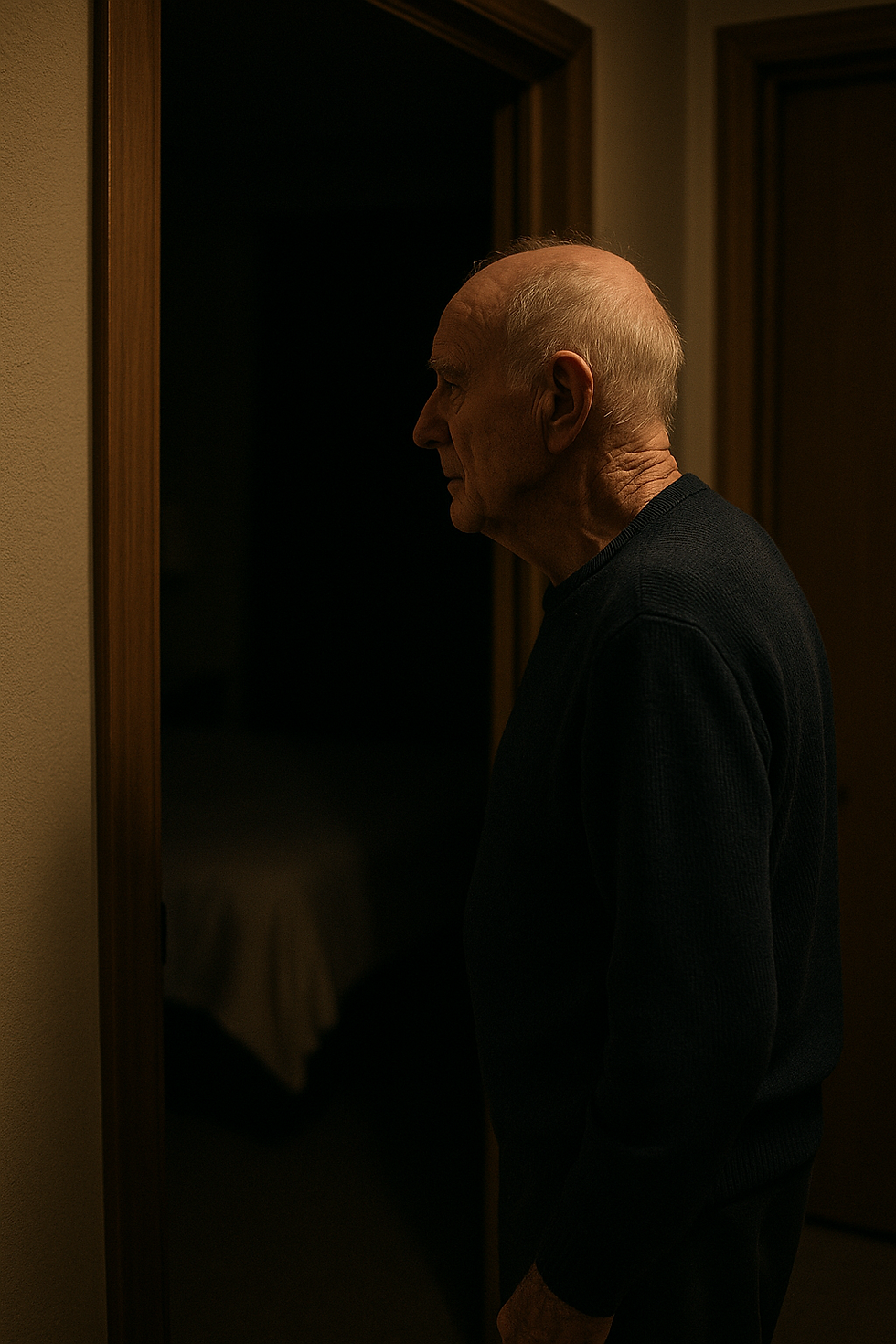Can Alzheimer's Be Reversed? What Most Doctors Aren't Telling You
- Franklin Saavedra

- May 23, 2025
- 6 min read
Updated: Jun 24, 2025
If you’ve ever been told, “There’s nothing we can do,” this post is for you.
As a former nurse and current dementia educator, I’ve had that exact conversation with families—especially before I learned about emerging protocols that challenge the conventional view. I’ve watched the hope drain from their faces when they’re told Alzheimer’s is progressive, untreatable, and irreversible.

Lifestyle Shifts
But here’s the truth: in its early stages, Alzheimer's can be reversed—or at least significantly improved. Not easily, not quickly, and not with a pill. But it is possible.
Let me take you back to a time on the ward. I remember caring for a man named Glen (pseudonym). He was newly diagnosed with early-stage Alzheimer’s. He still remembered his wife’s name, loved music, and was proud of his sharp wit. But he also knew something was slipping. Glen was determined not to fade quietly. He wanted to fight back.
And fight he did—not with denial, but with change. His family pursued what’s now known as the Bredesen Protocol, a multi-pronged approach that has been shown in peer-reviewed research to reverse cognitive decline in some patients.
What Is the Bredesen Protocol?
Developed by Dr. Dale Bredesen, this protocol focuses on identifying and correcting the many different underlying causes of cognitive decline. His work has pioneered a new approach to Alzheimer’s care, combining personalized treatment and lifestyle medicine.
It’s not a one-size-fits-all plan—it’s personalized, comprehensive, and rooted in lifestyle change.
Core Principles of the Bredesen Protocol:
Reduce inflammation
Stabilize blood sugar
Optimize sleep and stress
Eliminate toxins
Nourish the brain with targeted nutrition and supplements
Stimulate brain activity and connection
It treats Alzheimer’s like the metabolic, inflammatory, and lifestyle-based condition it is.
10 Lifestyle Shifts That Can Improve or Reverse Cognitive Decline
Here are the core changes outlined in the Bredesen Protocol that Glen and others have followed to regain cognitive clarity:
Cut Out Sugar and Processed Foods Excess sugar fuels inflammation and causes insulin resistance in the brain. Cutting it out helps stabilize blood glucose and protect neurons from damage. A great starting point is the Keto & Low-Glycemic Meal Guide for Brain Health (Paid link), which offers meal plans that avoid processed sugar and refined carbs, helping to reduce brain fog and stabilize energy levels.
Get Quality Sleep (7–8 hours) Deep sleep is when your brain flushes toxins and consolidates memory. Poor sleep increases your risk for Alzheimer’s. Create a calming bedtime routine—many people find the Weighted Blanket for Anxiety and Sleep Support (Paid link) promotes relaxation and reduces nighttime restlessness, leading to more restorative sleep.
Practice Intermittent Fasting Fasting 12–16 hours allows the body to engage in autophagy, a natural cleanup process that removes damaged cells and proteins—including amyloid plaques linked to Alzheimer’s. If you're new to fasting, the Beginner’s Guide to Intermittent Fasting (Paid link) is a helpful resource to get started and understand how to implement it safely.
Use Brain-Boosting Supplements Many people with cognitive decline are deficient in nutrients like B vitamins, DHA (an omega-3), magnesium, vitamin D, and CoQ10. The Top-Rated Cognitive Support Supplement (Paid link) includes brain-friendly nutrients like B12, omega-3s, and antioxidants designed to support memory and focus.
Move Every Day Exercise improves blood flow to the brain, reduces inflammation, and enhances mood. Even 20–30 minutes of walking daily can help. For a low-impact option that fits into daily routines, the Home Pedal Exerciser for Seniors (Paid link) is perfect—even from a chair—to keep the body moving and improve circulation.
Detox Your Home and Body Environmental toxins like mold, mercury, and pesticides can worsen memory loss. Consider checking air quality with a HEPA Air Purifier for Home Use (Paid link), which helps reduce exposure to airborne toxins like mold spores, dust, and other pollutants that may affect brain health.
Prioritize Brain-Stimulating Activities The brain thrives on challenge. Reading, puzzles, and learning new skills all promote neuroplasticity. Tools like the Memory Game Set for Seniors (Paid link) offer cognitive engagement in a fun and stimulating way, especially designed for older adults.
Cultivate Deep Sleep Hygiene Sleep quality matters just as much as quantity. Keep your sleep environment dark and cool, and minimize screen time before bed. Blue Light Blocking Glasses (Paid link) can help protect your melatonin levels and support more restful, deep sleep.
Engage in Social Connection Loneliness has a profound impact on health. Regular conversation and emotional connection are essential for brain function. Join clubs, volunteer, or simply stay connected with friends and family—it all makes a difference.
Work with a Functional Practitioner A doctor trained in functional medicine can test for root causes like nutrient deficiencies, toxins, gut health, and hormone imbalance—and design a plan tailored to your needs. Use this Directory of Functional Medicine Practitioners to find a certified provider who can guide your personalized care plan.
But Is It Easy?
No. Glen had to make uncomfortable changes. He missed his wine. He didn’t love fasting. But slowly, over six months, his wife saw a light return to his eyes. He started remembering names again. He even re-learned how to play piano pieces he thought were long lost.
Is it a cure for everyone? No. But it’s not the hopeless diagnosis we’ve been led to believe.
Final Thoughts
Alzheimer’s is complex, but it is not untouchable. There is something you can do. And if your loved one is still in the early stages, that window of possibility is still open.
If this post sparked something in you, I encourage you to explore further, seek functional guidance, and above all, believe that healing is possible.
With care and conviction,
Rebecca Saavedra
Former Nurse | Educator
P.S. If you found this helpful, I invite you to subscribe to my newsletter below. You’ll receive thoughtful, practical insights like this—delivered straight to your inbox.
FAQ: Reversing Early Alzheimer’s with the Bredesen Protocol
Can Alzheimer's be reversed in its early stages?
Yes. Recent research and clinical case studies using the Bredesen Protocol have shown that early cognitive decline from Alzheimer’s may be reversible in some individuals. This depends on addressing root causes like inflammation, blood sugar issues, nutrient deficiencies, and toxin exposure.
What is the Bredesen Protocol for Alzheimer's?
The Bredesen Protocol is a personalized, multi-factorial treatment developed by Dr. Dale Bredesen. It targets over 30 mechanisms that contribute to cognitive decline, including metabolic imbalance, inflammation, sleep disruption, and nutrient depletion.
What are the best supplements for reversing early Alzheimer's?
High-ranking search queries show interest in cognitive supplements with B vitamins (especially B12), omega-3s like DHA, magnesium, vitamin D, and CoQ10. These support brain health by improving cellular energy, reducing inflammation, and enhancing neurotransmitter function.
Does intermittent fasting help with Alzheimer's?
Yes. Intermittent fasting supports autophagy, the brain's self-cleaning process. This helps remove amyloid plaque and other cellular debris linked to Alzheimer's. Fasting 12–16 hours a day is a common approach.
Can a keto diet improve Alzheimer's symptoms?
Many people ask, "Is keto good for Alzheimer's?" The answer: yes, for some. A ketogenic or low-glycemic diet reduces insulin resistance and provides ketones as an alternative fuel source for brain cells, improving cognitive function in some cases.
How does sleep affect memory and Alzheimer’s?
Deep sleep is crucial for flushing toxins from the brain, especially beta-amyloid. Poor sleep quality is a known risk factor for cognitive decline. Sleep aids like blue light blockers and weighted blankets can help improve rest.
Are there functional medicine doctors who treat Alzheimer’s?
Yes. Functional medicine practitioners take a root-cause approach and are trained in protocols like Bredesen's. Search interest in "functional medicine for Alzheimer’s near me" shows growing awareness of this treatment path.
How long does it take to see improvement with the Bredesen Protocol?
Searches like "how long for Bredesen Protocol to work" are common. Improvements vary, but many families report changes in memory, mood, or focus within 3 to 6 months when following the protocol consistently.
What toxins are linked to Alzheimer's disease?
Common environmental toxins such as mold, mercury, pesticides, and air pollutants can increase neuroinflammation and accelerate cognitive decline. The Bredesen Protocol includes steps for detoxification and home environment clean-up.
What are early signs of cognitive decline that the Bredesen Protocol can help with?
Ranking search phrases include "early signs of Alzheimer's" and "brain fog causes." Early symptoms may include forgetfulness, word-finding issues, mood changes, and difficulty concentrating—all of which the protocol aims to address with personalized strategies.
Affiliate Disclaimer:As an Amazon Associate, I earn from qualifying purchases. I only recommend products I believe in, and all links marked "(Paid link)" help support this blog at no additional cost to you.
Note: Before starting any supplement routine, consult your doctor or healthcare provider to ensure they’re appropriate for your specific medical needs. While I share science-backed, general wellness information, I’m not your personal physician. I don’t have access to your health history or prescriptions and cannot predict how supplements may interact with your current medications or conditions.
Disclaimer: These stories are inspired by real experiences in long-term care. Names and identifying details have been changed to protect privacy. In some cases, elements may be composite to reflect common clinical patterns and emphasize educational points. The intent is to inform and advocate, not to assign blame or disclose personal information.



Comments